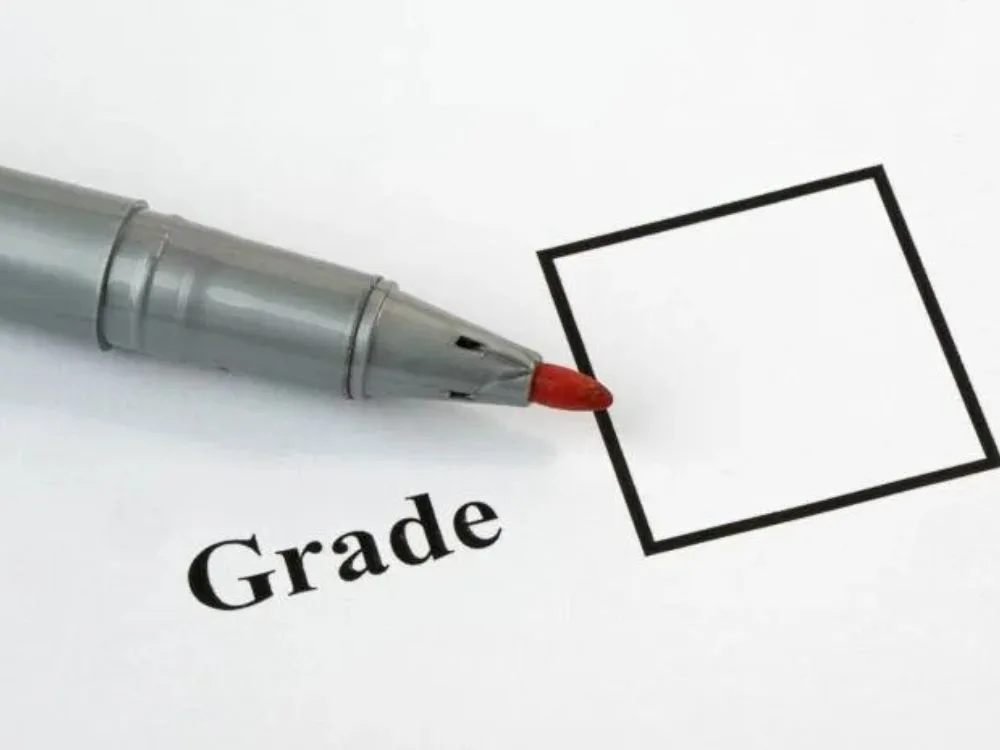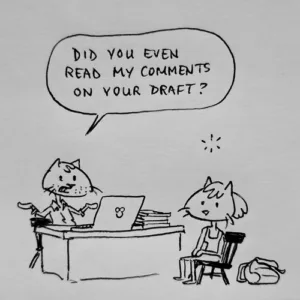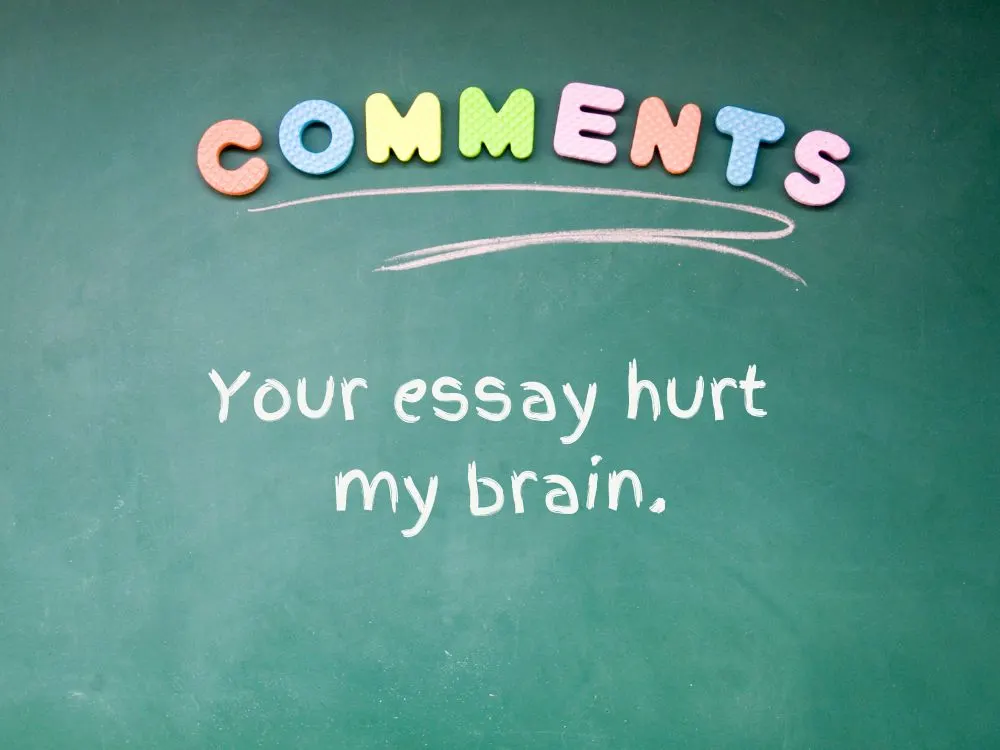Comments on student writing can be one of the most tedious, frustrating parts of being a teacher. You find yourself writing the same few things repeatedly, and even though there’s probably a rubric that gives substantial feedback, students and parents still expect additional comments that are more tailored to them.
Feedback on writing can be crucial for improvement, but how often do students take the input and apply it to their next piece of writing? Some don’t even read the comments; they just look at the grade, and the paper goes into the recycling bin!
One way to force students to use your feedback is to have them hold onto the last writing assignment or collect it and re-issue it the next time you give a writing assignment. Then, have them attach it to the next piece of writing and see if they have actually applied any of your feedback. Make sure to have “growth” or “applying feedback” as part of the new grade.
But what kind of comments should you be making? This article delves into the various types of constructive comments you can make on student writing.
Argumentative Writing or Debate
Use these comments when students have to write an argument that takes one side of a debate.
- Organization and Clarity: Viewpoints and responses are clear and organized
- Use of Facts and Examples: Arguments are supported with facts and examples
- Relevance of Supporting Arguments: All supporting arguments are relevant
- Strength of Arguments: All arguments are solid and convincing
Personal Narrative
Use these comments when students have a personal narrative essay, such as the college application essay.
- Organization and Focus: Clear main ideas and supporting details, stays on topic
- Originality: Vivid details, fresh word choice, creativity, risk-taking
- Writer’s Voice: consistent throughout, engaging, conveys individual personality
- Technical Errors: Spelling, grammar, punctuation, usage
- Power overall: exciting topic, clearly developed; holds the attention of the reader
Literary Analysis
Use these comments when students have to analyze literature in any way including identifying and evaluating author’s style or purpose.
- Makes a claim: Clear and specific thesis that accurately identifies how the author used a specific element to achieve a particular purpose
- Uses support: Analysis of the techniques used is thorough and fully explains HOW and WHY the techniques are effective
- Conclusion: effectively sums up your main point and evaluates the effectiveness of the author’s techniques
- Purpose: writing is formal and purposeful, style follows proper grammatical, syntactical, and spelling rules
Fictional Narrative
Use these comments any time students have to write a piece of fiction.
- Uses proper format (font, spacing, heading, original title)
- Length: Minimum of ____words
- Proper use of dialogue
- Vivid Descriptions of characters and setting
- Conventions: The writer uses standard writing conventions effectively and purposefully
- Effect: the story has an intended effect on the reader
- Conclusion: The story feels complete, not as if it needs more details; the conflict has been resolved
Synthesis Essay
A Synthesis essay is a multi-paragraph essay that includes quotes and details for support from two or more sources.
- Essay contains a logical organizational format with an introduction that ends with the thesis, supporting paragraphs with topic and concluding sentences, a conclusion, and transitions
- Essay incorporates valid and significant support from at least two sources that explicitly connect to add support to the thesis that is cited using the proper citation
- Essay contains sound mechanics, has been proofread, and is free of grammatical and spelling errors

Research Paper
A research paper includes quotes and citations from multiple sources.
- Content/Information: You successfully provide the history or background on the chosen topic. There is evidence that you carefully selected the information provided. All information is accurate, relevant, and engaging
- Organization: You organized the information in a logical, purposeful, and coherent way
- Research and Citations: You carefully researched the topic using reliable sources of information. You included a properly formatted works cited page that lists all sources cited in the paper
- Use of Language: Your writing has been proofread carefully and is generally free of all errors in spelling, punctuation, capitalization, grammar, and usage

General Essay Scoring Rubric
Use this rubric for any general piece of writing.
Score of A
A paper in this category is outstanding, demonstrating clear and consistent mastery, although it may have occasional errors. Such a paper will:
- effectively and insightfully addresses the writing task,
- is well organized and fully developed, using clearly appropriate examples to support ideas,
- displays consistent facility in the use of language, demonstrating variety in sentence structure and range of vocabulary.
Score of B
A paper in this category is effective, demonstrating reasonably consistent mastery, although it will have occasional errors or lapses in quality. Such a paper will:
- effectively addresses the writing task,
- is generally well organized and well developed, using appropriate examples to support ideas,
- displays facility in the use of language, demonstrating some syntactic variety and range of vocabulary.
Score of C
A paper in this category is competent, demonstrating adequate mastery with occasional errors and lapses in quality. Such a paper will:
- addresses the writing task,
- is organized and adequately developed, using examples to support ideas,
- displays adequate but inconsistent facility in the use of language, presenting some errors in
- grammar or diction present minimal sentence variety
Score of D
A paper in this category is inadequate but demonstrates developing mastery. Such a paper may contain one or more of the following weaknesses:
- inadequate organization or development
- inappropriate or insufficient details to support ideas
- an accumulation of errors in grammar, diction, or sentence structure
Score of E
A paper in this category is seriously limited, demonstrating little mastery. Such a paper is flawed by one or more of the following weaknesses:
- poor organization,
- thin development
- little or inappropriate detail to support ideas
- frequent errors in grammar, diction, and sentence structure
As much as students hate to write papers, we hate to grade them. It’s tedious and bordering on torture. But having comments at the ready can speed up the process and even make it more meaningful for those students who choose to actually read and apply the feedback.


Bushra Imtiaz
Saturday 23rd of November 2024
I need some good remarks for my students of grade 5.I have to give them remarks on their fable writing.I have no idea of remarks on story and fable writing.Students make so many mistakes in sentence structure and they don't use appropriate adjectives and make grammatical errors too.